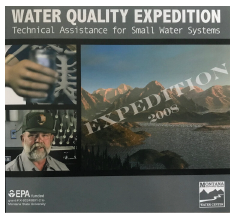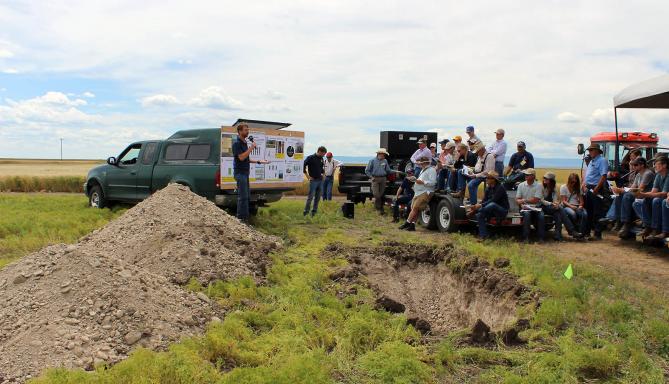
CREWS University or “CREWS-U” is a resource for Montana professionals ranging from land resources managers and wastewater operators to K-12 teachers and informal educators who wish to obtain professional development and resources that relate to the research findings and broad concepts of the Montana NSF EPSCoR Track-1 project (CREWS stands for the Consortium for Research on Environmental Water Systems).
The professional development resources we offer are guided by research data from stakeholder surveys and statewide needs assessments, and formats include self-paced online courses, in-person workshops, webinars, publications, and other tools.
For questions about CREWS-U or to submit a suggestion for a new course or resource, please contact Suzi Taylor (taylor@montana.edu) or Madison Boone (madison.boone@montana.edu).
For Workforce Development
Evaluating Irrigation Efficiency: Toward a Sustainable Water Future
The Montana Water Center (MWC) works with experts across the state and the Intermountain West to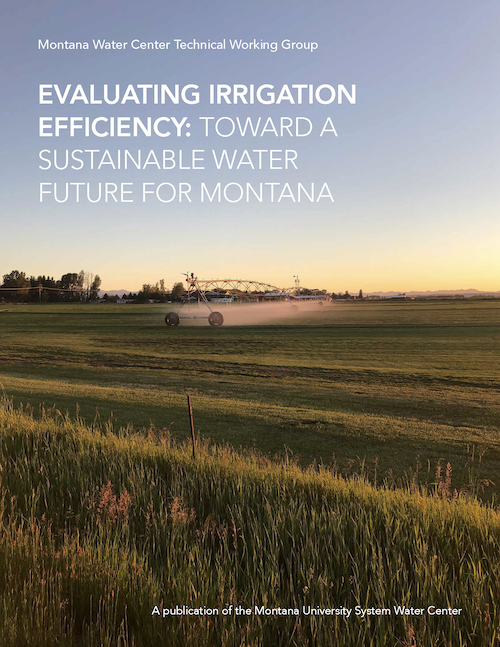 understand and synthesize issues of vital importance for Montana’s water future. In light of this mission, and as a follow up to the 2018 Montana Water Summit, the MWC convened a technical working group in 2019-2020 to investigate the topic of irrigation efficiency and water conservation. In bringing together researchers, practitioners, managers, and policymakers, the goal of this project was to provide accurate, unbiased, and relevant information about the complex interplay between irrigation efficiency and water conservation at various scales.
understand and synthesize issues of vital importance for Montana’s water future. In light of this mission, and as a follow up to the 2018 Montana Water Summit, the MWC convened a technical working group in 2019-2020 to investigate the topic of irrigation efficiency and water conservation. In bringing together researchers, practitioners, managers, and policymakers, the goal of this project was to provide accurate, unbiased, and relevant information about the complex interplay between irrigation efficiency and water conservation at various scales.
Following a series of webinars, working group meetings, outreach events, and interviews, the MWC created a publication synthesizing key information gleaned throughout the project. Links to the publication, key messages, and related webinars are below. The MWC continues work on this topic and welcomes feedback and potential collaboration.
Report Link: Evaluating Irrigation Efficiency: Toward a Sustainable Water Future
Webinar Links: Evaluating Irrigation Efficiency Webinars
Water and Wastewater Operator Training Resources
Between 2000 and 2010, the Montana Water Center (MWC) created a series of online, CD, and DVD training resources for and small water and wastewater systems operators. Created through a series of grants from the EPA, these resources provided valuable training and continuing education opportunities, particularly for small, rural water system operators. Using the technology and tools available at the time, the media team at the Montana Water Center (MWC) developed programs covering groundwater and surface water basics, water contamination, water quality, water treatment technologies, stormwater issues, and small water system operations.
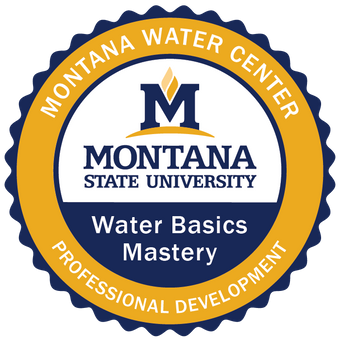 In partnership with Montana NSF EPSCoR, the MWC has updated four courses from the resources listed above. These courses are available to take for free at the links below. Participants can earn a digital badge for each course and a Water Basics Mastery badge if all four courses are completed. Students may be able to apply their learning outcomes toward professional CEUs in their own state; however, the Montana Water Center does not offer CEU certificates. Learn about all four courses here. http://ato.montana.edu/water/
In partnership with Montana NSF EPSCoR, the MWC has updated four courses from the resources listed above. These courses are available to take for free at the links below. Participants can earn a digital badge for each course and a Water Basics Mastery badge if all four courses are completed. Students may be able to apply their learning outcomes toward professional CEUs in their own state; however, the Montana Water Center does not offer CEU certificates. Learn about all four courses here. http://ato.montana.edu/water/
Water Quality Basics
This course takes water system personnel and regulators on a virtual expedition through water quality issues, including primers on the hydrologic cycle and determinants of water quality and sections on key issues such as fate and transport, iron and manganese, hard water, fire in the watershed, animal feeding operations, nutrients, wastewater treatment, and emerging contaminants.
Operator Basics: Ground Water Systems
Take Operator Basics: Ground Water Systems
This course will provide water operators with a basic knowledge of public water supply systems. Operators will understand the definition of a public water supply system and know the basic criteria by which such systems are classified. They will understand what is required of operators and/or managers of public water supply systems in order to keep their skills up-to-date and ensure that public health is protected.
Operator Basics: Surface and Ground Water Systems
Take Operator Basics: Surface and Ground Water Systems
This course focuses on information and issues specific to systems that rely on surface water sources for their water supply, but also contains content regarding ground water systems. This course will also provide water operators with a basic knowledge of hydrology and public water supply systems. Learners will understand what is required of operators and/or managers of public water supply systems in order to keep their skills up-to-date and ensure that public health is protected.
Operator Basics: Wastewater Lagoon Systems
Take Operator Basics: Wastewater Lagoon Systems
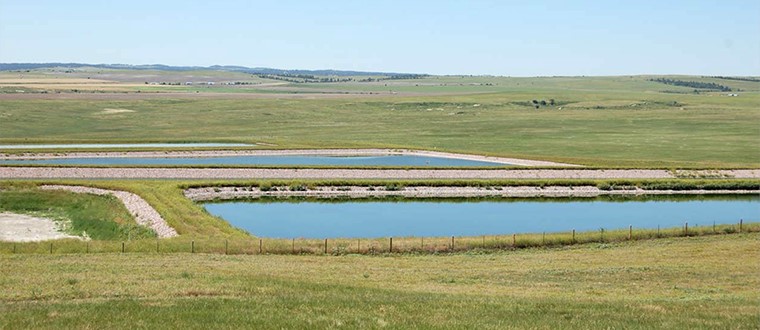 This course focuses on information and issues specific to the collection, treatment and management of wastewater lagoon systems. Learners will understand what is required of operators and/or managers of public water supply systems in order to keep their skills up-to-date and ensure that public health is protected.
This course focuses on information and issues specific to the collection, treatment and management of wastewater lagoon systems. Learners will understand what is required of operators and/or managers of public water supply systems in order to keep their skills up-to-date and ensure that public health is protected.
For Educators
Montana Girls STEM Collaborative
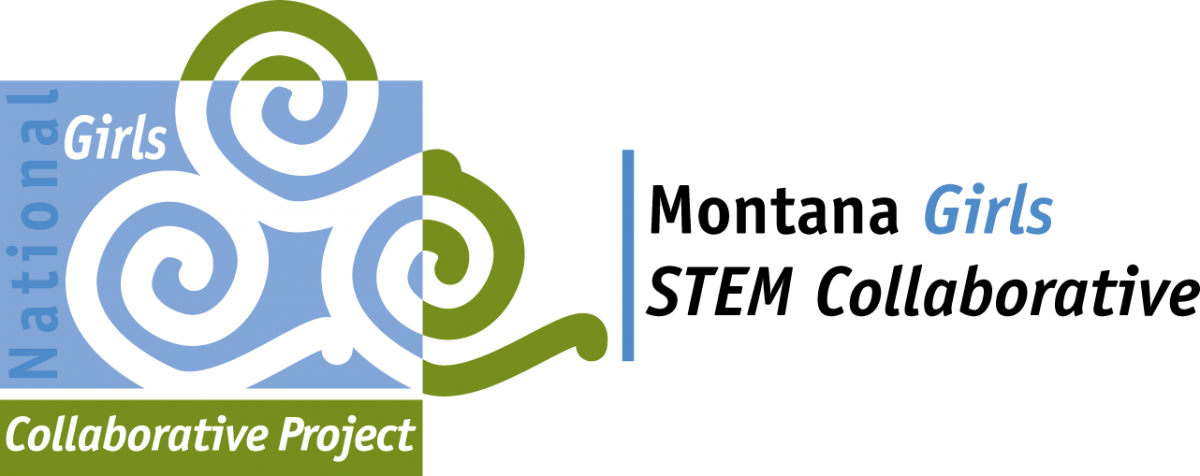
The Montana Girls STEM Collaborative brings together organizations throughout Montana that are committed to informing and motivating girls to pursue careers in science, technology, engineering, and mathematics (STEM). The program is based upon a model developed by the National Girls Collaborative Project and replicated through a grant from the National Science Foundation. It uses a variety of activities, materials, and resources to accomplish its goals, including:
- Collaboration forums that include networking, presentations on local STEM projects, and best practices
- Social media: Facebook and Twitter
- A free quarterly e-newsletter that includes STEM events and opportunities (Sign up)
- Presentations to professional associations and other organizations
- Access to national programs including The Connectory and FabFems
Project activities are designed to facilitate connections between organizations to maximize access to shared resources, strengthen the capacity of existing and evolving projects by sharing exemplary practice research and program models, outcomes, and products, and use the leverage of a network and the collaboration of individual girl-serving programs to create the tipping point for gender equity in STEM.
"Why Should We Care if Girls Like Math?" Webinar
The "Why Should We Care if Girls Like Math?" webinar, presented by Suzi Taylor, Director of the Science Math Resource Center, looks at trends for girls and women in STEM and examines surprising data about women's attitudes towards math in countries around the world. To watch the webinar and access referenced materials, please visit the following link: Why Should We Care if Girls Like Math? Webinar
Additional resources on gender equity in STEM include:
-
Keeping Girls in STEM: 3 Barriers, 3 Solutions - Edutopia.org. Stereotypes and cultural norms dampen girls' interest in STEM, but educators can counter the disparities with small changes to their practice
-
5 Ways Society Sabotages Girls’ Interests in Math and Science (Forbes)
-
Math + culture = gender gap? Researchers have all but debunked the idea that girls are innately worse at math than boys. But psychologists have identified other factors that might set girls back (American Psychological Association)
STEM Summit 2019 Report
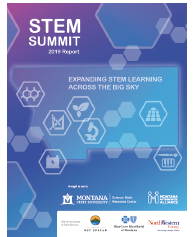 On Aug. 8, 2019, 165 representatives from education, industry, non-profits, and other institutions gathered at Montana State University to discuss how we can better collaborate to advance STEM learning in the state. The event was scheduled strategically between the Science Summer Institute (primarily for K-12 teachers) and the Montana Afterschool Alliance annual conference and received support from Blue Cross Blue Shield of Montana, Northwestern Energy, and Montana NSF EPSCoR.
On Aug. 8, 2019, 165 representatives from education, industry, non-profits, and other institutions gathered at Montana State University to discuss how we can better collaborate to advance STEM learning in the state. The event was scheduled strategically between the Science Summer Institute (primarily for K-12 teachers) and the Montana Afterschool Alliance annual conference and received support from Blue Cross Blue Shield of Montana, Northwestern Energy, and Montana NSF EPSCoR.
The report below outlines barriers, ideas, resources, and next steps for expanding STEM learning across the Big Sky State. Also included are post-summit actions from August 2019 through February 2020. To access a PDF of the report, please click on the link below.
Report Link: STEM Summit 2019 Report
Citizen Science and the Lewis & Clark Trail - Workshop
Bring history, citizen science, NASA technologies, and Montana water quality research to your classroom or out-of-school program as you meld the mystique of the Lewis & Clark National Historic Trail with modern tools for data collection.
When Meriwether Lewis and William Clark journeyed 8,229 miles across America in the early 1800s, they used laborious and time-consuming processes to record their observations and map the region. Fast-forward 200+ years, and we now carry sophisticated tools for data collection right in our pockets!
This workshop was for current Montana educators working with youth in grades 5-12 in a classroom or out-of-school environment.
Resources from this workshop are coming soon!
Montana K-12 Educator Needs Assessment
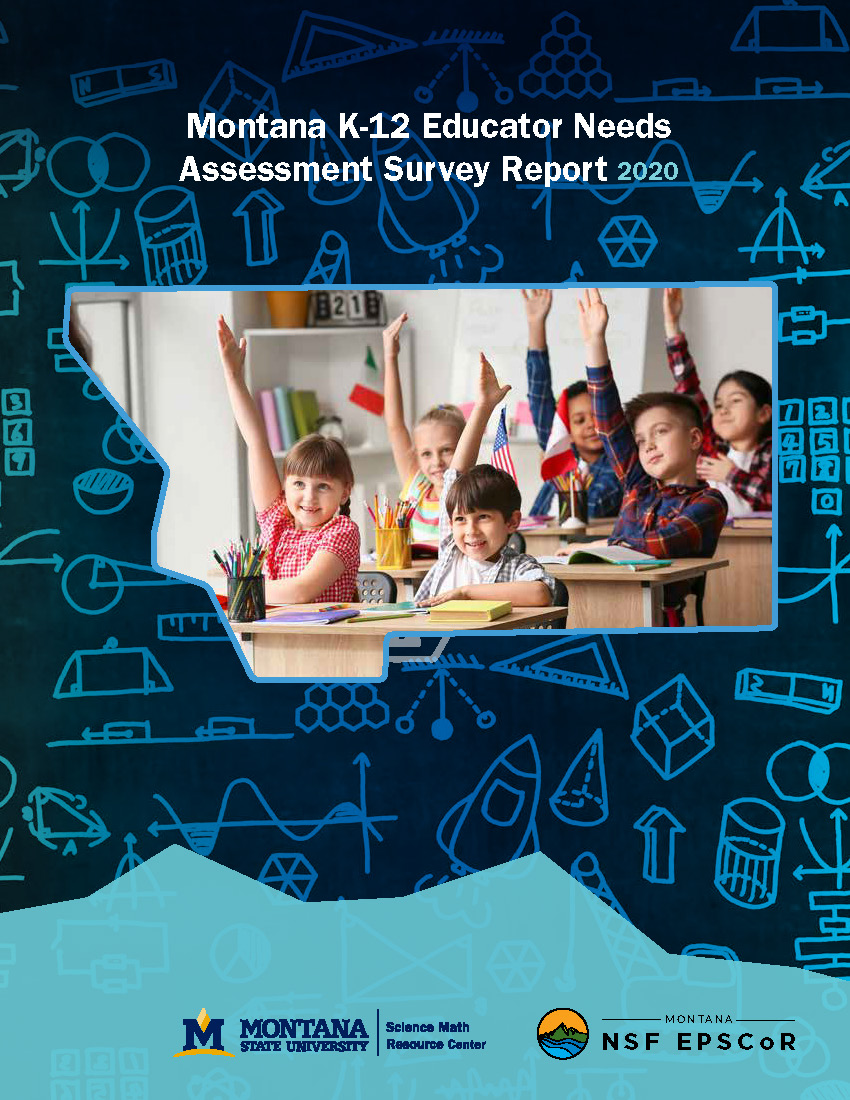 As part of the Education-Outreach-Diversity team for Montana NSF EPSCoR, the Science Math Resource Center (SMRC) in the Montana State University Department of Education sought to encapsulate the professional development (PD) needs and interests of Montana K-12 educators, with a particular emphasis on teachers of STEM subjects (science, technology, engineering, and mathematics).
As part of the Education-Outreach-Diversity team for Montana NSF EPSCoR, the Science Math Resource Center (SMRC) in the Montana State University Department of Education sought to encapsulate the professional development (PD) needs and interests of Montana K-12 educators, with a particular emphasis on teachers of STEM subjects (science, technology, engineering, and mathematics).
This report examines survey responses of over 200 Montana K-12 educators and presents descriptive and correlational findings in regard to: (a) educator and school district characteristics; (b) access to technological resources; (c) school/district strengths and weaknesses that impact PD implementation; (d) barriers to PD; (e) attitudes toward STEM PD; (f) PD location, delivery method, time, and duration preferences; (g) importance of and interest in PD topics; (h) usefulness of data set resources and interest in water quality data sets; and (i) interest in resources related to university research.
Based on the presented findings, implications for designing and implementing PD for Montana K-12 educators are discussed.
Link to HTML webpage version of report: Educator Needs Assessment Page
Link to report PDF: Montana K-12 Educator Needs Assessment Survey Report PDF
